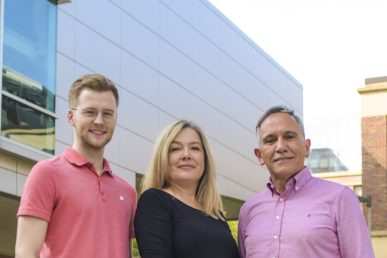HIV, AIDS training center at UIC goes national with help of $3M grant
The Midwest AIDS Training and Education Center at the University of Illinois Chicago will expand its services nationwide with the help of a new $3 million grant.
The center, which was founded in 1988 to provide HIV/AIDS training for medical students and primary care physicians, already works to bring the U.S. Department of Health and Human Services’ Health Resources and Services Administration‘s National HIV Curriculum to medical students and professionals in 10 midwestern states: Illinois, Indiana, Iowa, Kansas, Michigan, Minnesota, Missouri, Nebraska, Ohio and Wisconsin.
“MATEC will build on the lessons learned from a previous project carried out in the past four years when we worked with 16 academic institutions with accredited programs of medicine, nursing and pharmacy in the Midwest,” said Dr. Ricardo Rivero, MATEC’s executive director and a co-principal investigator on the grant. “With this project, we successfully integrated content from the National HIV Curriculum E-Learning Platform into their existing curricula. By doing so, we firmly believe we enhanced the quality of HIV education and training at those institutions.”
MATEC, which is based in the UIC Department of Community and Family Medicine at the College of Medicine, will use these new funds to introduce the curriculum to academic institutions in the 57 jurisdictions outside the Midwest that have been designated “high priority” by the federal government’s Ending the HIV Epidemic in the U.S. initiative.
In addition to continuing its work with graduate schools in medicine, nursing and pharmacy, MATEC will use the new funds to target physician residency programs for dentists and family medicine practitioners.
“The National HIV Curriculum has a tremendous impact on our students’ ability to provide knowledgeable and compassionate care to people living with HIV,” said Natacha Pierre, UIC clinical assistant professor of population health nursing science at the College of Nursing and co-investigator on the grant. “Increasing the number and quality of health care providers is essential to increasing access to care and ending the HIV epidemic. If we are to meet the U.S. Department of Health and Human Services’ goal to end the HIV epidemic by 2030, we need to go national. We are up for the challenge.”
According to Corina Wagner, MATEC research and evaluation manager and co-principal investigator on the new grant, “The project will assist existing faculty, especially those who are not HIV specialists and who may lack the HIV clinical background, with knowledge of HIV content, teaching methods and ways to address potential students’ reluctance to engage with vulnerable communities such as the ones most affected by HIV.”
Rivero said, “By doing so, the project will continue to address students’ and residents’ attitudinal barriers to care for people living with or at risk of acquiring HIV, and we expect that those who have been trained in HIV care through the integrated National HIV Curriculum will be able to identify, address or properly refer their patients with HIV-related needs, particularly for chronic illness interventions that appear as a growing number of people living with HIV age.”
Other key faculty and co-investigators on the new grant include Dr. Mahesh Patel, assistant professor at the College of Medicine; Blake Max, clinical associate professor at the College of Pharmacy; and Dr. Sarah Henkle, assistant professor of clinical family medicine at the College of Medicine.
Written by Laura Fletcher.
Categories
Health Sciences Colleges, Research
Topics
AIDS, epidemic, HIV, Midwest AIDS Training and Education Center, patient care, primary care, public health


